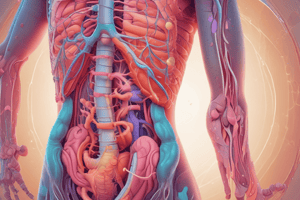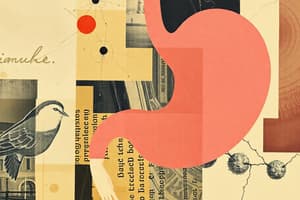Podcast
Questions and Answers
What is the primary role of hydrochloric acid (HCl) in the stomach?
What is the primary role of hydrochloric acid (HCl) in the stomach?
- To create an acidic environment for food breakdown and sterilization (correct)
- To facilitate the absorption of vitamin B12
- To neutralize alkaline substances from food
- To hydrolyze proteins into amino acids
Which substance is crucial for the activation of pepsinogen into pepsin?
Which substance is crucial for the activation of pepsinogen into pepsin?
- Intrinsic factor
- Cholecystokinin
- Gastrin
- Hydrochloric acid (correct)
Which of the following substances is NOT produced by parietal cells?
Which of the following substances is NOT produced by parietal cells?
- Mucus
- Hydrochloric acid
- Intrinsic factor
- Pepsinogen (correct)
What protective role does mucus play in gastric secretions?
What protective role does mucus play in gastric secretions?
Which mediator is considered an endocrine factor regulating acid secretion by parietal cells?
Which mediator is considered an endocrine factor regulating acid secretion by parietal cells?
Which of the following substances is essential for the absorption of vitamin B12 in the intestine?
Which of the following substances is essential for the absorption of vitamin B12 in the intestine?
What effect do prostaglandins (PGs) have in gastric protection?
What effect do prostaglandins (PGs) have in gastric protection?
What is the primary reason that gastric secretions are considered non-essential for the assimilation of a mixed meal?
What is the primary reason that gastric secretions are considered non-essential for the assimilation of a mixed meal?
Flashcards
Hydrochloric Acid (HCl)
Hydrochloric Acid (HCl)
A strong acid secreted by parietal cells in the stomach. It aids in digestion by breaking down food and has antibacterial properties.
Pepsinogen
Pepsinogen
An inactive enzyme precursor secreted by chief cells. It gets converted to pepsin in the acidic stomach environment, where it plays a crucial role in protein digestion.
Intrinsic Factor
Intrinsic Factor
A protein produced by parietal cells, essential for the absorption of vitamin B12 (cobalamin) in the small intestine.
Mucus
Mucus
Signup and view all the flashcards
HCO3- (Bicarbonate)
HCO3- (Bicarbonate)
Signup and view all the flashcards
Aggressive Factors
Aggressive Factors
Signup and view all the flashcards
Protective Factors
Protective Factors
Signup and view all the flashcards
Lipase
Lipase
Signup and view all the flashcards
Study Notes
Lesson 19: Gastric Secretions
- Gastric secretions are the stomach's first major digestive component
- The stomach is a muscular reservoir for food
- The stomach's digestive functions are not essential for the absorption of a mixed meal
- A degree of gastric secretion is needed for vitamin B12 absorption
- Gastric acid also aids in the absorption of iron
- Gastric secretions aid in food sterilization
Index
- Gastric secretions: The study of secretions in the stomach
- Regulation of acid secretion by parietal cells: The control mechanisms behind acid production in parietal cells
- Main mediators: Substances that regulate the process, including histamine (paracrine), gastrin (endocrine), acetylcholine, PGE2, PGI2, and somatostatin
- Drugs used to inhibit or neutralize acid gastric secretion: Medications like histamine receptor antagonists, proton pump inhibitors, and antacids
- Drugs that protect the mucosa: Substances that safeguard the stomach lining.
Gastric Secretion
- Stomach is a muscular reservoir for food
- Gastric juices are the primary source of digestive power
- Digestive functions aren't essential for a mixed meal assimilation
- Sufficient gastric secretion is needed for vitamin B12 absorption
- Gastric acid facilitates iron absorption
- Stomach secretions assist in food sterilization
Gastric Secretion
- The stomach has layers- mucosa, submucosa, muscularis externa, and serosa
- The mucosa has surface epithelium, lamina propria, and muscularis mucosae
- Parietal cells reside in gastric pits, within gastric glands.
- Chief cells are also in gastric glands
- Enteroendocrine cells also reside in gastric glands
Gastric Substances
- Hydrochloric Acid (HCl): Produced by parietal cells, creates an acidic environment for initial food breakdown and has antimicrobial properties.
- Pepsinogen: Secreted by chief cells, it becomes pepsin in the acidic environment, a crucial enzyme for protein digestion.
- Intrinsic Factor: Also produced by parietal cells, assists in vitamin B12 absorption in the intestines.
- Mucus: Secreted by mucous cells, creates a protective layer in the stomach.
- Lipase: Produced by chief cells, aids in the initial digestion of triglycerides.
Regulation of Acid Secretion by Parietal Cells
- Acid secretion disturbances are implicated in peptic ulcer pathogenesis.
- Main mediators controlling parietal cells acid secretion:
- Histamine, a stimulatory local hormone
- Gastrin, a stimulatory peptide hormone
- Acetylcholine, a stimulatory neurotransmitter
- PGE2 and PGI2, local hormones that inhibit acid secretion
- Somatostatin, an inhibitory peptide hormone
Main Mediators
- Histamine: Secreted by ECL cells and maintains a basal release of histamine; found near parietal cells, important for initiating and sustaining histamine production,
- Gastrin: A polypeptide synthesized by G cells; stimulates HCL production, Located in the pyloric antrum, stomach, duodenum, and pancreas, triggers HCL release.
- Acetylcholine: Stimulates muscarinic M3 receptors, elevates intracellular Ca2+ and triggers proton (H+) release into the stomach.
- Prostaglandins (PGE2 and PGI2): Important for protecting the stomach lining via bicarbonate secretion and increasing mucus production, inhibiting HCL secretion.
- Somatostatin: An inhibitory peptide hormone, regulates and controls other mediators.
Drugs Used to Inhibit/Neutralize Gastric Acid Secretion
- Histamine H2 receptor antagonists (e.g., cimetidine, ranitidine, famotidine): Inhibit basal and food-stimulated acid secretion, promote healing of gastric/duodenal ulcers
- Proton pump inhibitors (e.g., omeprazole, lansoprazole, pantoprazole): Irreversibly inhibit H+-K+-ATPase, reduce acid secretion both basal and stimulated
- Antacids (e.g., hydrotalcite, magnesium and aluminum salts): Neutralize stomach acid, inhibit peptic enzyme activity
Helicobacter pylori
- Helicobacter pylori infection is a key factor in ulcer development
- It colonizes the gastric mucosa, causing chronic inflammation and disrupting mucosal defenses.
- It increases acid production and produces toxins
Treatment of Helicobacter pylori Infection
- A combined treatment targeting Helicobacter pylori is commonly utilized for ulcer healing: Antibiotics, proton pump inhibitors, and bismuth chelate.
Drugs that Protect the Mucosa
- Bismuth chelate: Toxic effects on Helicobacter pylori, OTC for mild cases of gastrointestinal issues (e.g., blackening of the tongue, nausea, vomiting, and encephalopathy with impaired renal excretion.
- Sucralfate: Forms complex gels with mucus, stimulates mucus and bicarbonate secretion, and protects the stomach lining.
Misoprostol
- Stable analogue of PGE2, promotes ulcer healing and aids in preventing chronic gastric issues associated with the use of NSAIDs.
- It also increases mucosal blood flow and increases mucus and bicarbonate secretion. Side effects include diarrhea and abdominal cramps. (Not used during pregnancy)
Studying That Suits You
Use AI to generate personalized quizzes and flashcards to suit your learning preferences.




